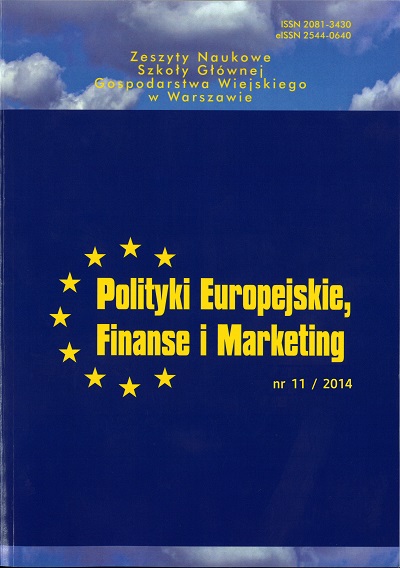Main Article Content
Article Details
Aaker D.: Building strong brands. The Free Press, New York, 1996.
Armitage C.J., Conner M.: Efficacy of the theory of planned behaviour: A meta-analytic review. British Journal of Social Psychology 40/2001, s. 471-499. (Crossref)
Cichocka I., Pieczonka W.: Struktura jakości produktów żywnościowych współczesnego konsumenta. Problemy Jakości 8/2004, s. 13-18.
del Río B., Vázquez R., Iglesias V.: The role of the brand name in obtaining differential advantages. Journal of Product & Brand Management 10/2001,s. 452-465. (Crossref)
Douglas S.P., Craig C.S.: Collaborative and iterative translation: An alternative approach to back translation. Journal of International Marketing 15(1)/2007, s. 30-43. (Crossref)
Fisher M., Völckner F., Sattler H.: How important are brands? A cross category, crosscountry study. Journal of Marketing Research 5/2010, s. 823-839. (Crossref)
Garbarski L.: Zachowania nabywców. Polskie Wydawnictwo Ekonomiczne, Warszawa 2001.
Gorbaniuk O.: Personifikacja marki. Perspektywa psychologiczna i marketingowa. Wydawnictwo KUL, Lublin 2011.
Gutkowska K., Sajdakowska M., Żakowska-Biemans S., Kowalczuk I., Kozłowska A., Olewnik-Mikołajewska A.: Poziom akceptacji zmian na rynku żywności pochodzenia zwierzęcego w opinii konsumentów. Żywność. Nauka. Technologia. Jakość 5/2012, s. 187- 202.
Jalivand M., Samiei N., Mahdavina S.: The effect of brand equity components on purchase intention: An application of Aaker's model in the automobile industry. International Business and Management 2/2011, s. 149-158.
Jarmużek R., Banaszak A.: Korzyści i ich reprezentacja w różnych mediach reklamy. [w:] Psychologia a promocja: w poszukiwaniu skuteczności, W. Paluchowski, G. Bartkowiak (red.), Wydawnictwo Ryś, Poznań 2004, s. 371-397.
Kabacińska A., Babicz-Zielińska E.: Wpływ marki na akceptację cech sensorycznych jogurtów. Żywność. Nauka. Technologia. Jakość 4/2009, s. 388-394.
Keller K.: Conceptualizing, measuring, and managing customer-based brand equity. Journal of Marketing 57/1993, s. 1-22. (Crossref)
Laguna M.: Self-efficacy, self-esteem, and entrepreneurship among the unemployed. Journal of Applied Social Psychology 43/2013, s. 253-262. (Crossref)
McClure S., Li J., Tomlin D., Cypert K., Montague L., Montague P.: Neural correlates of behavioral preference for culturally familiar drinks. Neuron 2/2004, s. 379-387. (Crossref)
Nowak M., Trziszka T.: Zachowania konsumentów na rynku mięsa drobiowego. Żywność. Nauka. Technologia. Jakość 1/2010, s. 114-120.
Plummer J.: How personality makes a difference. Journal of Advertising Research 24/1984, s. 27-31.
Połom A., Baryłko-Piekielna N.: Analiza czynników decydujących o preferencjach polskich konsumentów mięsa wieprzowego. Żywność. Nauka. Technologia. Jakość 3/2004, s. 7-23.
Szwacka-Mokrzycka, J.: A study on food brand. Wydawnictwo SGGW, Warszawa 2011.
Razmus W.: Psychospołeczne korzyści w wizerunku marki produktu. (Niepublikowana rozprawa doktorska). Katolicki Uniwersytet Lubelski Jana Pawła II, Lublin 2013.
Tsai S.: Utility, cultural symbolism and emotion: A comprehensive model of brand purchase value. International Journal of Research in Marketing 22/2005, s. 277-291. (Crossref)
Wawszczak S., Śmiechowska M., Sterczyński R.: Próba identyfikacji czynników wpływających na preferencje młodych kobiet wobec piw ciemnych produkowanych metodą tradycyjną. Żywność. Nauka. Technologia. Jakość 1/2012, s. 196-205.
Downloads
- Maryna Panchenko, Maria Parlińska, PORTFOLIO RISK MANAGEMENT IN INVESTMENT ACTIVITY OF BANKING SECTOR , The Scientific Journal European Policies, Finance and Marketing: No. 11(60) (2014)
You may also start an advanced similarity search for this article.

This work is licensed under a Creative Commons Attribution-NonCommercial 4.0 International License.
All articles published in European Policies, Finance and Marketing are fully open access. In this way, the scientific research results contained in articles published in our journal are available to every reader free of charge - in accordance with the CC BY-NC license (https://creativecommons.org/licenses/by-nc/4.0/).
According to the CC BY-NC license you are free to:
- Share — copy and redistribute the material in any medium or format
- Adapt — remix, transform, and build upon the material
The licensor cannot revoke these freedoms as long as you follow the license terms.
Under the following terms:
- Attribution — You must give appropriate credit , provide a link to the license, and indicate if changes were made . You may do so in any reasonable manner, but not in any way that suggests the licensor endorses you or your use.
- NonCommercial — You may not use the material for commercial purposes .
- No additional restrictions — You may not apply legal terms or technological measures that legally restrict others from doing anything the license permits.
Source: https://creativecommons.org/licenses/by-nc/4.0/deed.en
According to that, the authors retain the copyright and full publishing rights.





